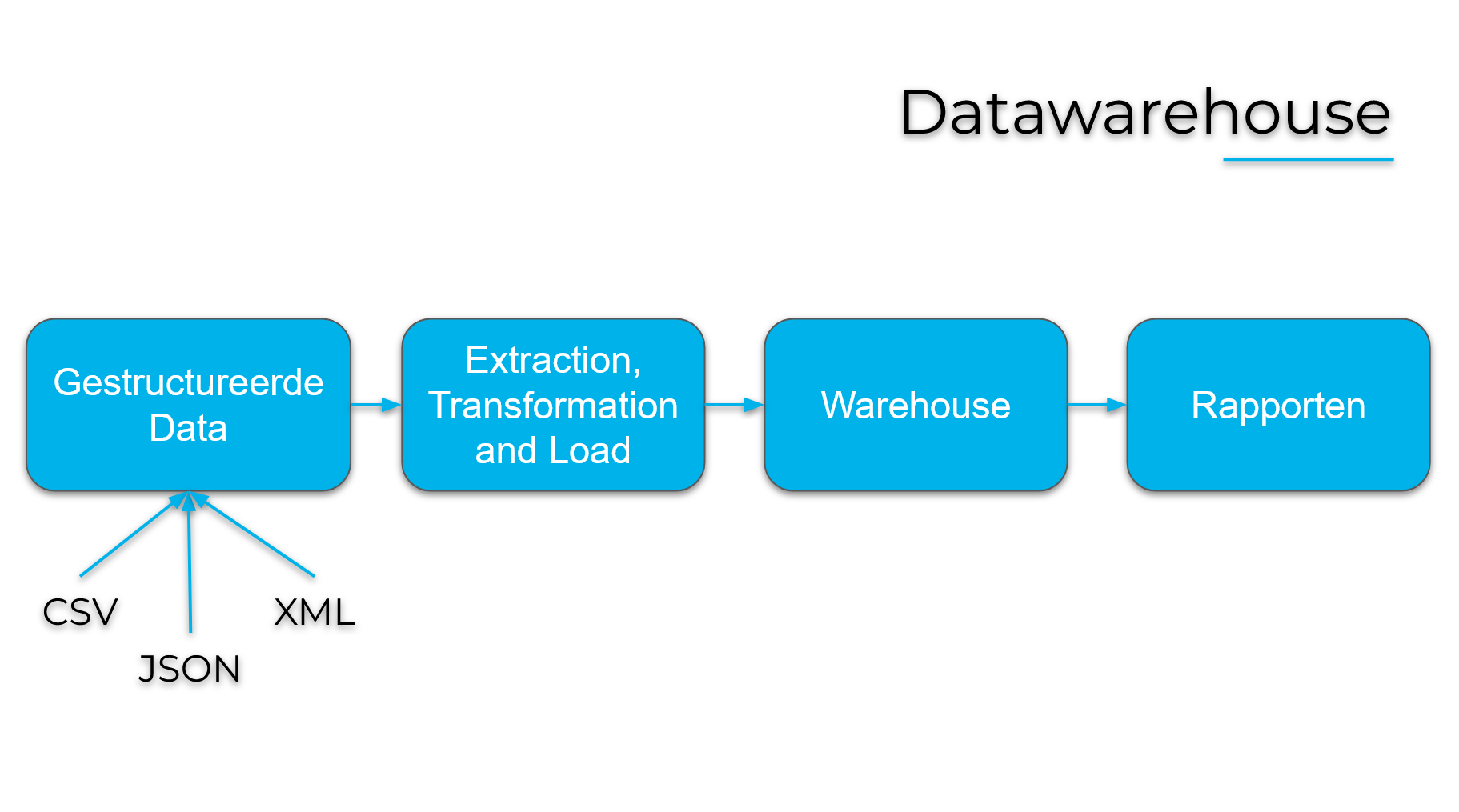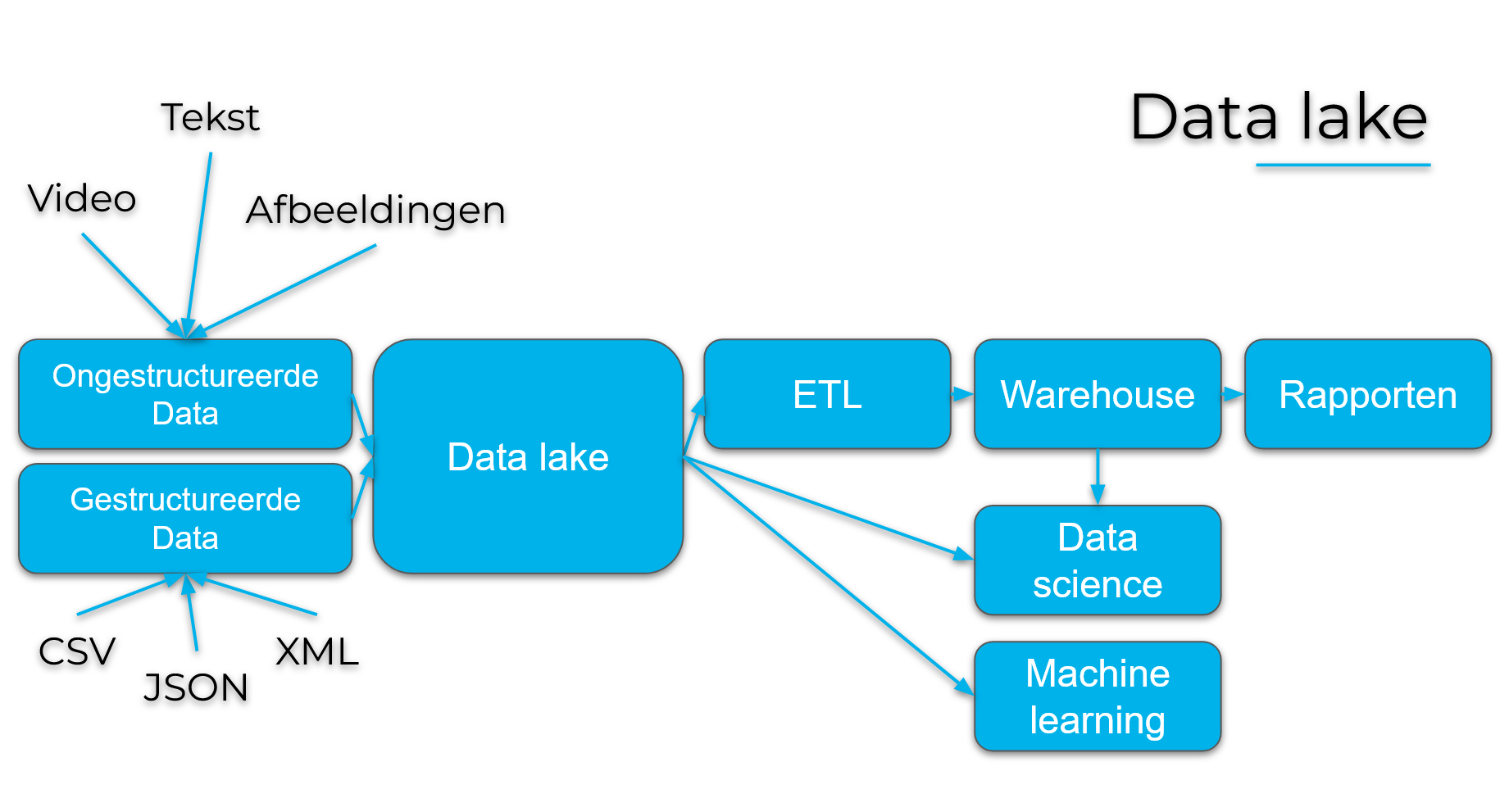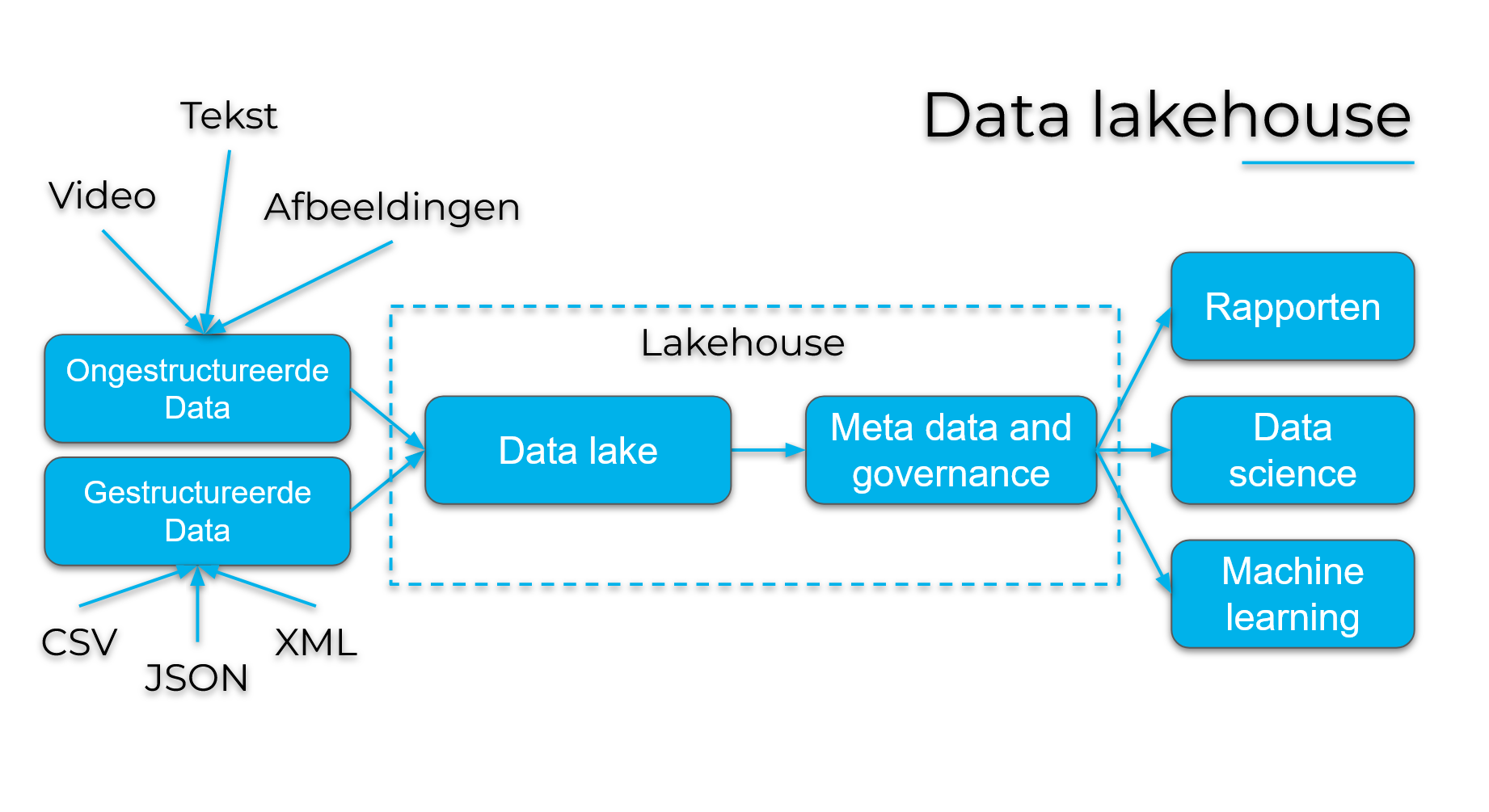Een goede data-infrastructuur: de basis van elke inzet van data science
Een goede data-infrastructuur en informatiehuishouding is essentieel om data science structureel en duurzaam in te kunnen zetten. In deze blog gaan we dieper in op drie fundamentele concepten van datamanagement: Datawarehouse, data lake en data lakehouse. Dit zijn manieren waarop organisaties data kunnen opslaan, beheren en analyseren. Ook belichten we hoe Researchable klanten ondersteunt in de opzet van een goed data-fundament.
Datawarehouse
Een datawarehouse is een centrale plek waar grote hoeveelheden data van verschillende afdelingen binnen een bedrijf worden verzameld. De data is gestructureerd, geordend en opgeslagen op een manier die het makkelijk maakt om vragen te stellen en analyses uit te voeren. Het gaat hierbij om historische data die is schoongemaakt en geordend. Datawarehouses worden gebruikt om beslissingen te nemen op basis van data, bijvoorbeeld door middel van rapportages en analyses.
Voordelen van een datawarehouse:
- •Overzichtelijke data: Alle data is netjes geordend en opgeslagen, waardoor het eenvoudig te analyseren is.
- •Snelle antwoorden: Datawarehouses zijn snel, waardoor je onmiddellijk antwoorden krijgt op je vragen.
- •Gemakkelijke rapportage: Datawarehouses maken het eenvoudig om zelf rapportages en dashboards te maken.
Een voorbeeld van een datawarehouse in de detailhandel:
Hoe ziet een datawarehouse er in de praktijk uit? Denk bijvoorbeeld aan een bedrijf in de detailhandel dat data verzamelt over transacties in al hun filialen. Deze data omvat informatie over producten, klanten, aankoopdatum en -tijd en de betaalmethode. Om analyses uit te kunnen voeren, worden deze gegevens eerst gecentraliseerd in een datawarehouse. Vervolgens kan het bedrijf zelf trends in koopgedrag analyseren, de effectiviteit van marketingcampagnes meten en de productvoorraad optimaliseren.

Data lake
Een data lake is een digitale opslagplaats waarin verschillende soorten data kunnen worden opgeslagen, zoals foto's, video's, teksten, sensordata en meer. In tegenstelling tot een datawarehouse, kan een data lake zowel gestructureerde als ongestructureerde gegevens opslaan in hun oorspronkelijke vorm, zonder dat de data nog bewerkt moet worden. Een data lake is in dat opzicht veel flexibeler omdat je er alle soorten data kunt opslaan, ongeacht de vorm of structuur. Dit maakt het perfect voor het verwerken van grote hoeveelheden data die met traditionele systemen niet kunnen worden geanalyseerd.
Voordelen van een data lake:
- •Flexibiliteit: Je kunt alle soorten data opslaan, ongeacht de vorm of herkomst.
- •Schaalbaarheid: Een data lake is flexibel en kan makkelijk worden uitgebreid. Zo is er altijd genoeg ruimte voor al je data, zelfs als die hoeveelheid enorm toeneemt.
- •Real-time data: Je kunt data in real-time verzamelen en analyseren.
Een voorbeeld van een data lake in de zorg:
Een zorgorganisatie wil haar data inzetten voor een efficiënter ziekenhuis en betere patiëntenzorg. In een data lake kunnen ze de data van het elektronisch patiëntendossier (EPD), medische apparatuur en sensoren verzamelen. Vervolgens kunnen ze data science toepassen om vast te stellen welke behandelingen effectief zijn, welke risicofactoren er zijn voor specifieke aandoeningen en hoe de kwaliteit van de zorg kan worden verbeterd. Met behulp van deze inzichten kan het ziekenhuis gepersonaliseerde behandelplannen opstellen, preventieve maatregelen nemen en de zorg voor patiënten verbeteren.

Data lakehouse
Een data lakehouse is een nieuwe benadering in dataopslag waarbij de voordelen van een data lake en een datawarehouse gecombineerd worden. Het biedt zowel de flexibiliteit van een data lake als de gestructureerde en geoptimaliseerde mogelijkheden van een datawarehouse.
Het belangrijkste verschil tussen een data lakehouse, een data lake en een datawarehouse is de geïntegreerde benadering en de combinatie van flexibiliteit en structuur. Een data lake is flexibel maar kan complex zijn qua beheer en analyse, terwijl een datawarehouse gestructureerd is maar minder flexibel. Een data lakehouse probeert deze nadelen te overwinnen door de voordelen van beide te combineren.
Een voorbeeld van een data lakehouse in de e-commerce sector:
Een wereldwijd opererende online winkel die kleding en accessoires verkoopt, wil haar gegevens gebruiken om de verkoop te stimuleren en klanttevredenheid te verhogen. Met een data lakehouse combineert de winkel netjes geordende gegevens uit het klantenbestand met een breed scala aan informatie uit klantbeoordelingen en klikgedrag op de website. Door geavanceerde data-analyse toe te passen, kan de winkel zien welke producten populair zijn, welke marketingcampagnes werken, en hoe ze de klantenservice kunnen verbeteren. De inzichten uit het data lakehouse stellen het bedrijf in staat om gerichte aanbevelingen te doen, de voorraad beter te beheren en uiteindelijk een persoonlijkere winkelervaring te bieden.

Researchable en data-management
Voor een duurzame inzet van data science is een goede data-infrastructuur en informatiehuishouding belangrijk. Of het nu gaat om het opzetten van een data lake voor een onderzoeksinstelling of het integreren van een lakehouse-architectuur voor een AI-startup. Bij Researchable begrijpen we dit en ontwikkelen we maatwerk oplossingen die passen bij de unieke behoeften van jouw organisatie. Met expertise in data-engineering helpen we organisaties om hun data volledig te benutten, inzichten te verkrijgen en innovatie te stimuleren.